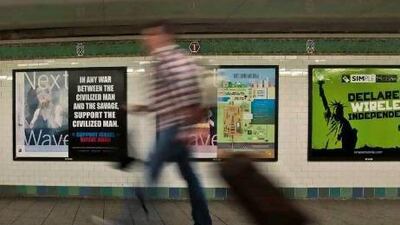NEW YORK // Anti-Muslim posters that have gone up in subway stations in New York and Washington, DC, have drawn muted reactions from Muslims, but Christian and Jewish organisations have countered with ad campaigns of their own.
And a United States congressman even called for a boycott of the capital's metro system. "The right to free speech is a right I will defend to my grave," Mike Honda, a Democrat from California, said last week.
"The right to not support hate speech is also a right, which is why I encourage people to boycott, if possible, [the subways] until the ad buys are finished."
Mr Honda, who was interned with his family in a US camp for people of Japanese descent during the second World War, added that, "We learn from history that hate speech and hysteria have dire consequences, the result of societal complacency, failed political leadership, and the lack of courage to stand up and speak out against hate."
The advertisements, paid for by the American Freedom Defence Initiative (AFDI), a right-wing, self-described anti-jihad organisation that has been labelled a hate group by the Southern Poverty Law Centre, read: "In any war between the civilised man and the savage, support the civilised man. Support Israel. Defeat jihad."
Authorities in both cities initially blocked the advertisements from running: in New York, on the grounds that they contained demeaning language, and in Washington because officials said federal agencies had warned them about terrorism threats. They also cited passenger safety if any fights broke out on subway platforms because of the posters.
The AFDI filed suits against the New York transport authority's decision in July and in Washington in September, and federal judges in both cases ruled that the advertisements were protected by free speech laws and ordered that they be allowed to run. They were posted at 10 subway stations in New York at the end of September and at four metro stations in Washington on October 8.
Muslim groups and activists did not organise protests but instead responded to the AFDI's campaign with ironic jokes on Twitter, using the hashtag "mysubwayad".
"What's been rewarding about this experience is seeing our interfaith partners and New Yorkers of all stripes rejecting these ads," said Cyrus McGoldrick, a spokesman with the Council on American-Islamic Relations pressure group, after the court ruling in New York.
Christian groups and an alliance of Jewish rabbis have both taken out advertisements of their own in reaction to the AFDI campaign.
One of the Christian groups, United Methodist Women, placed ads in the same subway stations as the ads, sometimes next to them. They read: "Hate speech is not civilised. Support peace in word and deed." And, in a nod to the Muslim activists' Twitter response, ends with "#mysubwayad".
Rabbis for Human Rights - North America posted their own adverts: "In the choice between love and hate, choose love. Help stop bigotry against our Muslim neighbours."
"[Pamela] Geller thinks she is speaking for the entire Jewish community," Rabbi Jill Jacobs, the executive director of Rabbis for Human Rights, told The New York Times, referring to the co-founder of the AFDI.
"We are a group of 1,800 rabbis and we want everyone to know that we have to work in partnership with the Muslim community and do not believe in dehumanising them."
Activists not associated with any religious group have also defaced the advertisements.
The Washington Examiner reported that a school teacher covered one of them with notes that read: "If you see something hateful say something peaceful." A spokesman for New York's transportation authority told the Times that the advertisements had been defaced at least 15 times.
Mr McGoldrick said that when the AFDI ran a similar campaign in August on trains in suburban New York state that read, in part, "It's not Islamophobia, it's Islamorealism", commuters tore down many of them.
"Most of the anger wasn't from the Muslim community," he said. "It was a very interesting response."

